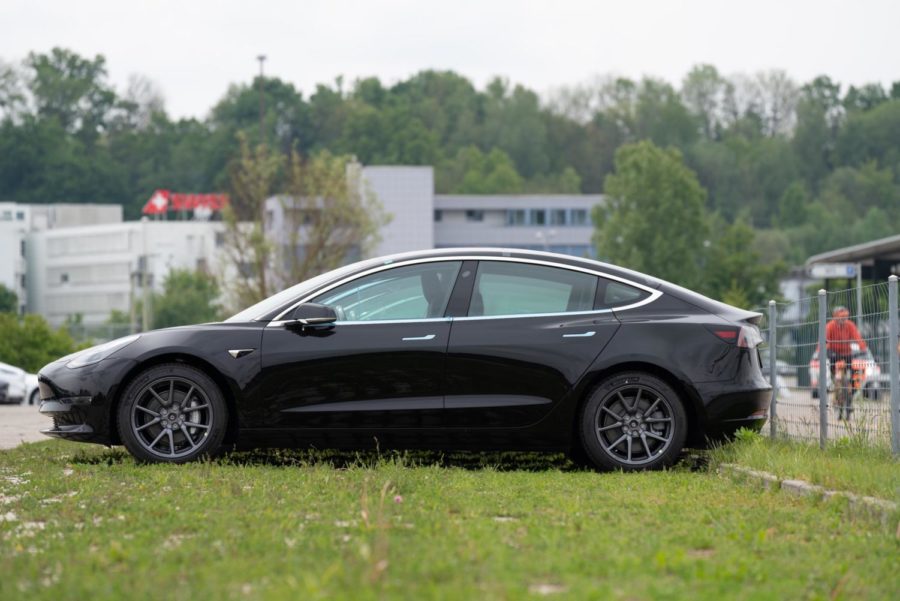Comparing fuel-powered and electric cars
The automobile industry has been greatly affected by the growing popularity of electric cars. The demand for infrastructure change to sustain these vehicles may be on the way.
January 24, 2021
As the demand for a sustainable environment increases, electric cars are becoming useful in helping eliminate climate change, experts say.
Electric cars are vehicles that are powered by pure electricity. These vehicles are slowly paving the way to end climate change, whereas fuel-powered cars harm the environment by releasing gas emissions into the atmosphere.
“Our primary tool to meet all of our emission goals is to eliminate climate change and greenhouse gases, so the benefit is to get us there because if we electrify our vehicles, we can eliminate fossil fuels big and fuller,” said David Cwiertny, professor of civil engineering at the University of Iowa.
Electric cars have been around for a long time, but now with more advertising. The first popular electric vehicle came out in 1997.
“The Toyota Prius came out in Japan in 1997, and they brought it to the United States in 2001,” said Dustin Miller, sales consultant at Ames Ford Lincoln. “Since 2005, 95 percent of those Priuses are still on the road today.”
Many people are starting to become more aware about climate change as electric cars become more available for consumers.
“They are accessible, people are buying them as fast as they’re coming in,” said Thomas Rodamer, sales consultant at Honda of Ames.
The most popular electric vehicle being bought is the electric hybrid, which are cars that are powered by both electricity and gas.
Electric cars are a lot quicker than average cars. They also lower the cost spent on gas and can be charged anywhere that has a charging station.
Electric cars can be charged in your home, at a car dealership or at a local gas station.
Most locations do not cost money to power a vehicle. If charging a car at home, it may increase the electricity bill. However, buying a solar panel can keep the car charged for a lifetime.
“One good thing about electric vehicles, I know some people did this in Arizona, they would add solar panels in their garage that will charge their vehicle,” said Jerry Hebrink, sales consultant at Honda of Ames. “It wouldn’t actually cost anything to charge their car because if you charge it at home, it will cost you your electricity, but if you use a solar panel, it doesn’t cost anything.”
Another benefit of these cars is car accidents are a lot cheaper to get fixed compared to a fuel-powered vehicle.
“If the battery gets smashed, you’ll have an added cost, but other than that, if the airbag is popped, it’s gonna be the same,” Miller said. “Typically, hybrid cars have equal reliability, higher resale value and equal or less maintenance. Each hybrid has a rejuvenated braking system, so the pressure doesn’t go to the break, it goes to the battery, so that’s a little less money in your pocket.”
However, electric cars take a long time to charge, depending on the power level of the charging station.
“My car is a plug-in hybrid, so I can go just by electricity and I can go for 48 miles on a full charge,” Hebrink said. “If I charged that on a 220 charging station, that takes two-and-a-half hours. But if I charged it on a regular 110, it would take seven-and-a-half hours, and you get 48 miles before it has to switch to have gas and create energy. At this point, it is just a very time consuming deal to charge your car.”
Electric cars don’t have enough range, and there are not enough charging stations in certain areas.
“I think the bigger problem is the mindset and the tension that you won’t be able to drive it to a certain destination,” said Anuj Sharma, associate professor of civil, construction and environmental engineering at Iowa State. “The infrastructure is already available for fuel-powered cars for that every two miles or three miles, you will have a gas pump and you won’t have to worry about that and the amount and getting from to Ames to Chicago, but in the case of a pure electric car, you will have to plan your destination.”
There is a huge investment that has to be made in order for electric cars to have the proper infrastructure to be able to last. Electric cars will have to be prepared for things such as a nationwide power outages in order to be the most valuable cars in the transportation industry.
Even though electric cars are sustainable for the environment, there is still demand for fuel-powered cars.
“We tax gas-powered vehicles to help fix the roadways because electric cars are using the same roadways as much as gas, but they don’t pay the same road-use tax that gas vehicles pay, so the highways aren’t going to be fixed as well,” said Jim Meadows, sales associate at Deery of Ames.
According to Meadows, hybrid cars are selling more than electric and fuel-powered vehicles combined, so it will still be a while until electric cars are up for full demand.
“I don’t think they will ever run out of business,” Rodamer said. “I think there will always be a hybrid option because the demand that an electric car can produce is not up to everyone’s standards of what they will need. There will always be a need for that diesel engine or that combustion engine.”







